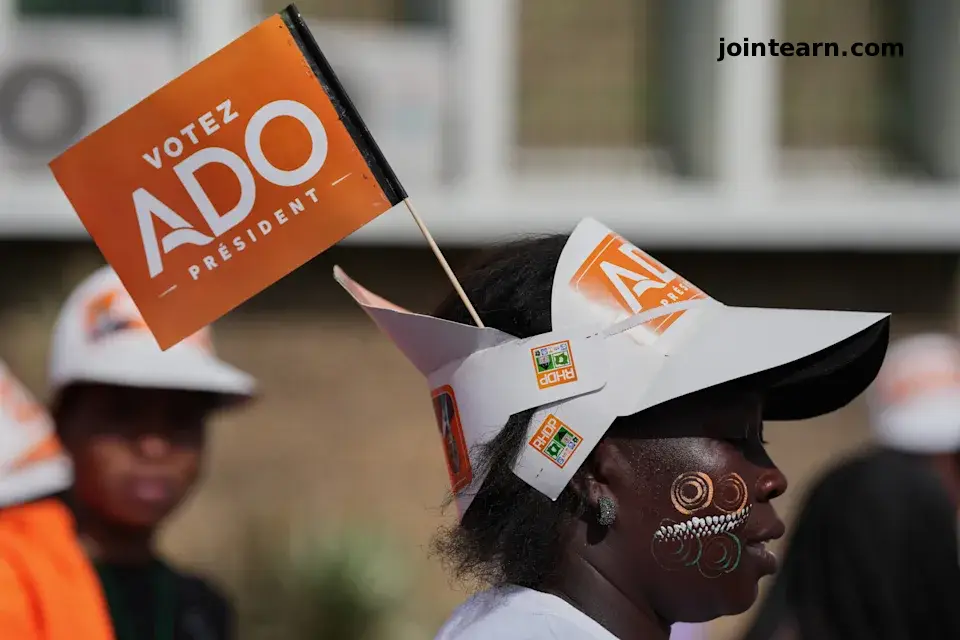
As Ivory Coast heads into one of its most consequential elections in years, candidates held their final campaign rallies on Thursday, marking the end of a tense and tightly controlled race dominated by incumbent President Alassane Ouattara. The West African nation of 30 million people will go to the polls on Saturday, October 25, 2025, with Ouattara widely expected to secure a fourth term in office.
Ouattara Eyes Fourth Term Amid Rising Political Tensions
The 83-year-old president, who has ruled the world’s leading cocoa producer since 2011, is running under the Rassemblement des Houphouëtistes pour la Paix (RHDP), with the campaign slogan “For a Great Nation.” His administration touts years of economic growth and infrastructure expansion, including modern bridges and highways in Abidjan, though critics say prosperity has not been evenly shared.
Thousands of enthusiastic supporters filled central Abidjan on Thursday for Ouattara’s final rally, waving party flags and chanting campaign songs. Standing on a stage overlooking the city’s skyline, the president struck a defiant tone, telling his opponents:
“The dogs are barking, but the caravan has moved already.”
His remark, referencing critics and disqualified rivals, underscored his confidence heading into Saturday’s vote.
Opposition Struggles to Unite After Disqualifications
The field of challengers has been significantly weakened following the disqualification of key opposition figures — former president Laurent Gbagbo and ex-Credit Suisse CEO Tidjane Thiam — both barred from running by the Constitutional Council. Their exclusion has drawn sharp criticism and sparked protests across the country, leading to hundreds of arrests and dozens of imprisonments.
Four remaining candidates — including former First Lady Simone Gbagbo, former Commerce Minister Jean-Louis Billon, and independent contenders Henriette Lagou and Ahoua Don Mello — wrapped up their campaigns with smaller rallies outside the capital.
Simone Gbagbo, 76, addressed her supporters in Aboisso, urging Ivorians to “restore justice and dignity,” while Jean-Louis Billon rallied his base in Bouaké, calling for “a new generation of leadership.”
However, analysts say the fragmented opposition stands little chance against the entrenched RHDP machinery.
“The absence of Thiam and Laurent Gbagbo has made this election a foregone conclusion,” said political analyst Koffi Kouadio. “Ouattara is running virtually unopposed.”
Abidjan on Edge as Election Nears
In Abidjan, the usually bustling commercial capital, the mood was subdued. Many businesses shuttered early amid fears of potential post-election violence. Ivory Coast’s elections have a troubled history — the 2010–2011 post-election crisis claimed more than 3,000 lives after disputed results between Ouattara and Gbagbo.
The city’s streets are now dominated by Ouattara’s campaign billboards, displaying his smiling portrait and slogans of stability and progress. In contrast, posters for opposition candidates are sparse.
“Ouattara will win in the first round,” predicted Ange Ouattara, a 25-year-old supporter. “His opponents are just for the sake of opposition.”
Security forces remain on alert, with thousands deployed nationwide to maintain order. The government has urged calm and banned unauthorized gatherings in the run-up to Saturday’s vote.
Election Outlook and Key Issues
Nearly 8.7 million registered voters will cast ballots for one of five candidates, though voter turnout remains uncertain amid calls for boycotts from some opposition factions.
The ruling party emphasizes economic stability and infrastructure growth, while critics highlight rising living costs, youth unemployment, and limited political freedoms.
Regional observers from the African Union (AU) and ECOWAS are expected to monitor the vote, with early results anticipated early next week. International analysts say a decisive first-round win by Ouattara could avoid a runoff but risks deepening political divisions.
“Ivory Coast stands at a crossroads — between stability and the possibility of unrest,” said Wathi Institute’s Gilles Yabi. “Much depends on how both sides handle the aftermath of this election.”


Leave a Reply